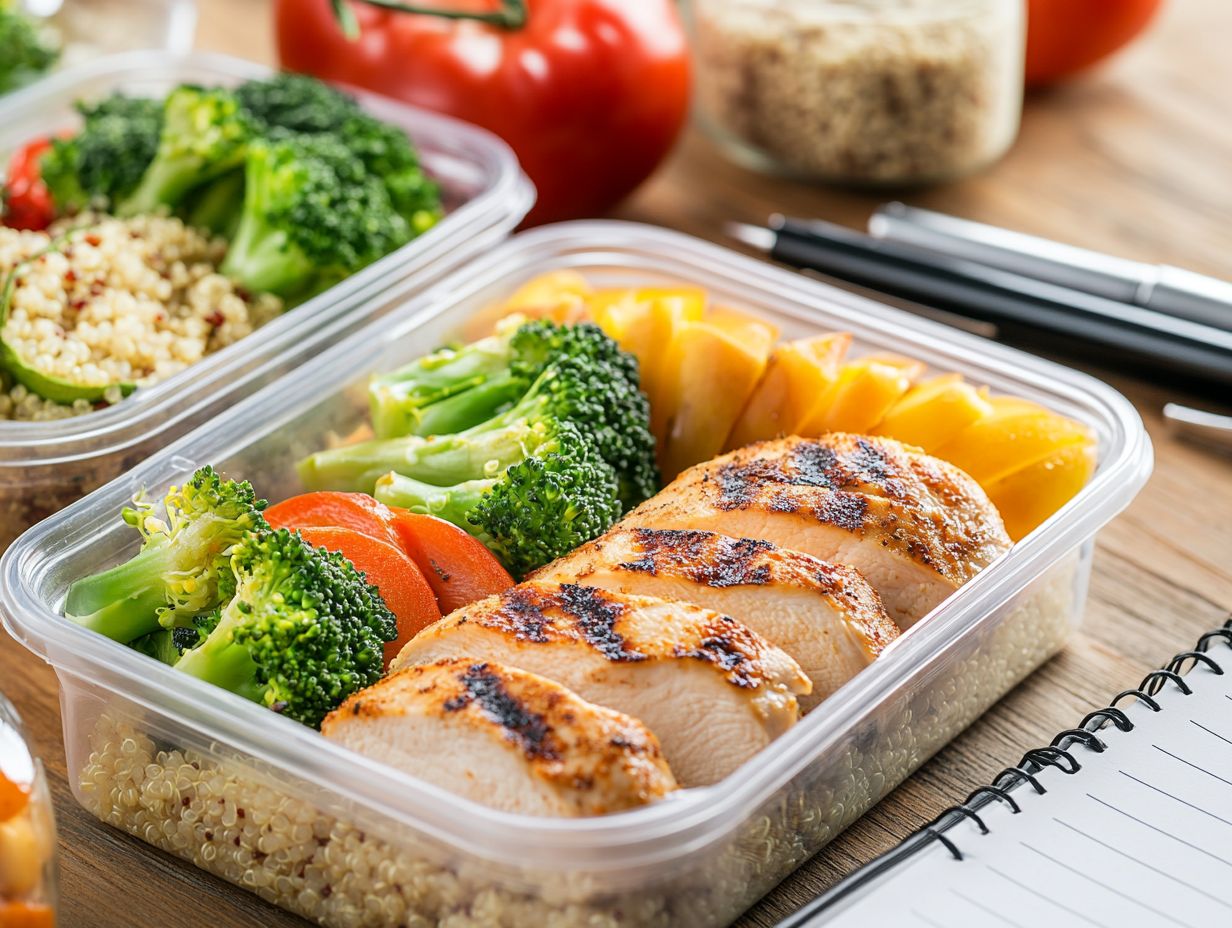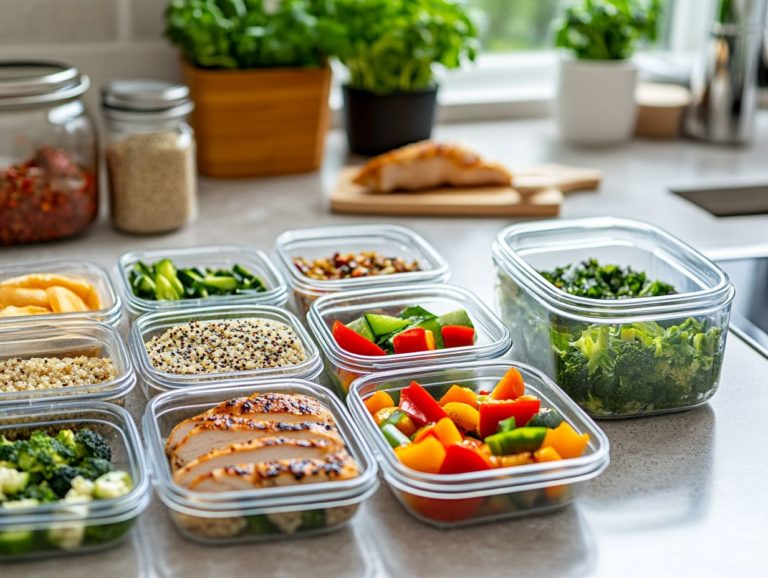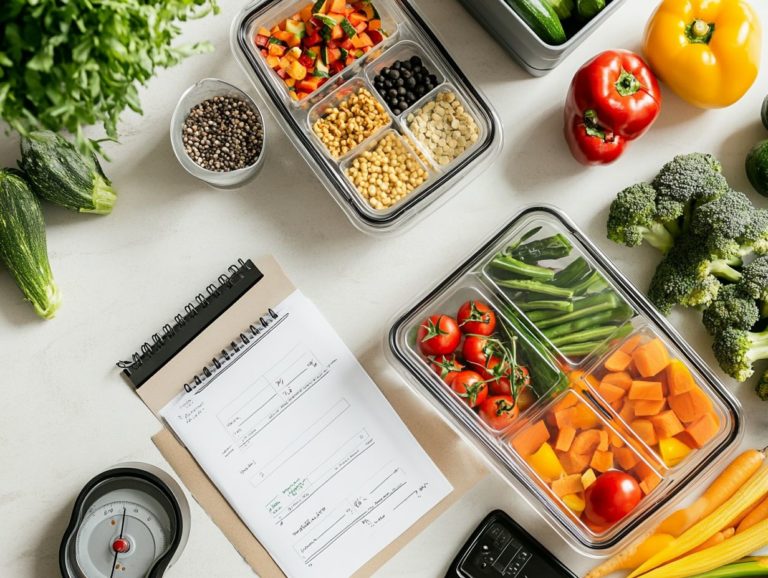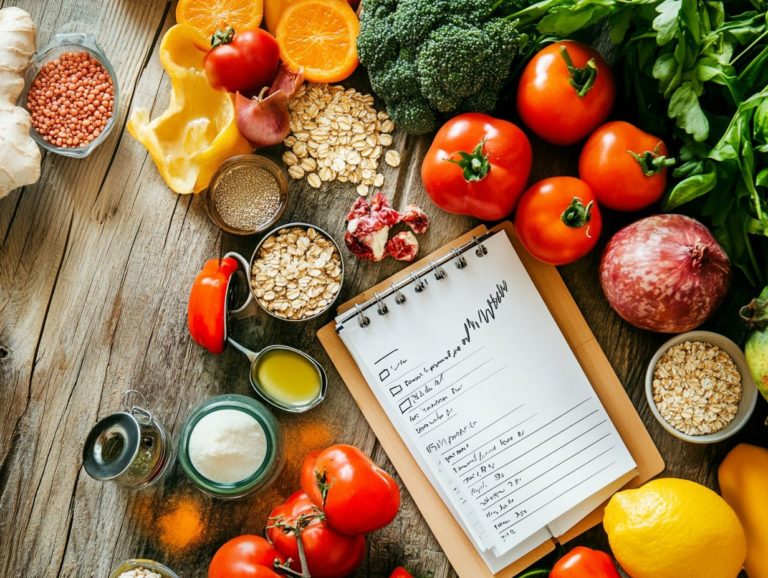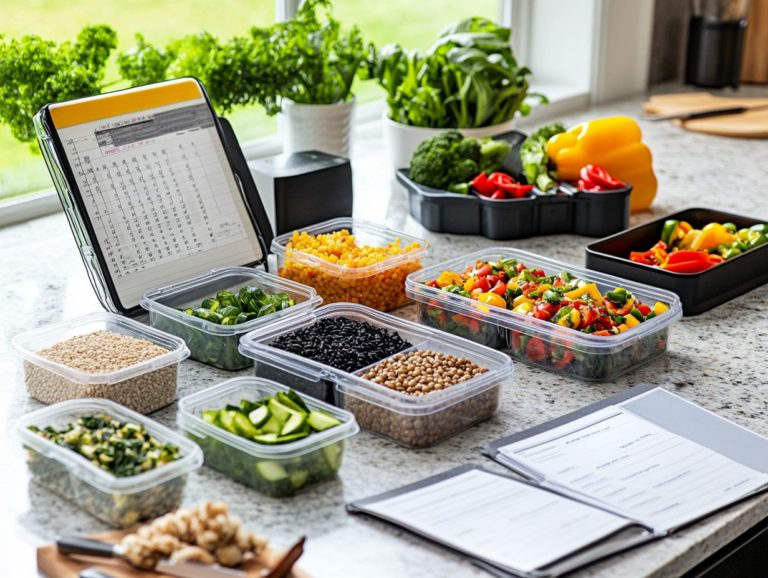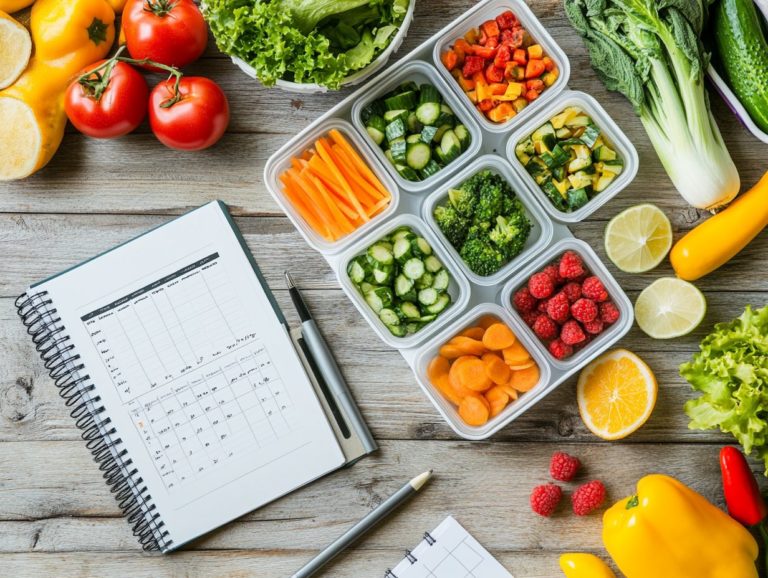Meal Planning for Weight Loss: A Complete Guide
Meal planning is a powerful tool for anyone wanting to lose weight effectively. By organizing your meals, you save time and make healthier choices.
This article explores the many benefits of meal planning. It will guide you in creating a plan tailored to your needs.
It also offers strategies for meal prepping to keep you on track during busy times. Dive in and explore how a little preparation can lead to big results!
Contents
- Key Takeaways:
- The Importance of Meal Planning for Weight Loss
- Creating a Meal Plan
- Healthy Meal Planning Tips
- Meal Prepping for Success
- Staying on Track with Your Meal Plan
- Preguntas Frecuentes
- Qu es la planificaci n de comidas para la p rdida de peso?
- Por qu es importante la planificaci n de comidas para la p rdida de peso?
- C mo empiezo a planificar comidas para la p rdida de peso?
- Cu les son algunos consejos para una planificaci n de comidas exitosa para la p rdida de peso?
- Puede la planificaci n de comidas ayudarme a perder peso m s r pido?
- Hay desventajas en la planificaci n de comidas para la p rdida de peso?
- Desventajas de la planificaci n de comidas
- C mo empiezo a planificar comidas?
- Consejos para una planificaci n de comidas exitosa
- Puede ayudarme a perder peso m s r pido?
Key Takeaways:
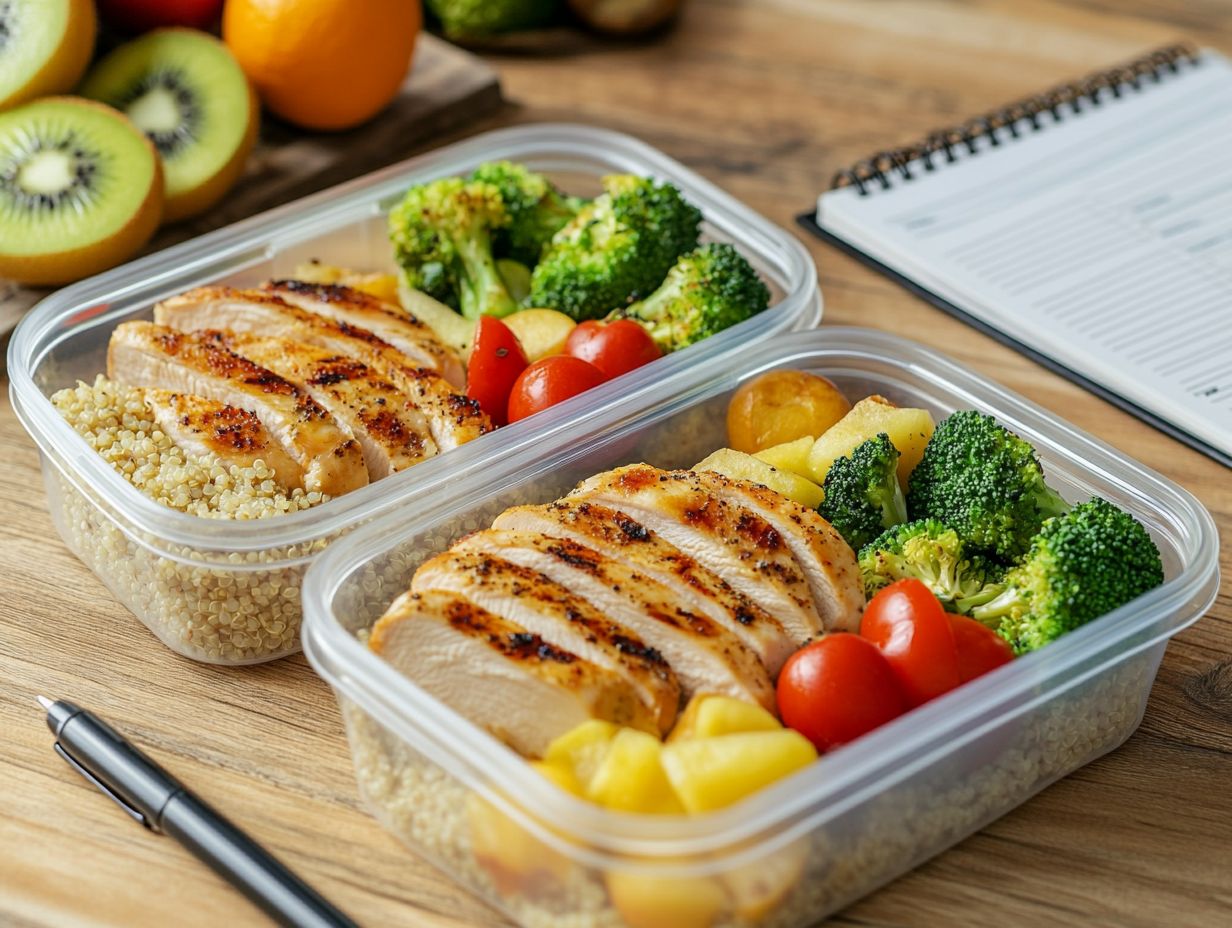
Meal planning is a crucial component of successful weight loss, providing structure, accountability, and convenience. A well-crafted meal plan considers factors such as dietary restrictions, taste preferences, and nutrient balance to promote sustainability and effectiveness.
Incorporating variety, portion control, and mindful eating techniques can enhance the healthfulness and enjoyment of your meals, contributing to long-term weight loss success.
The Importance of Meal Planning for Weight Loss
Meal planning is essential for effective weight loss, giving you the power to control your calorie intake while still enjoying balanced meals. For those following a plant-based lifestyle, meal planning for a plant-based diet can be particularly beneficial, ensuring your meals are filled with nutritious foods.
By crafting a structured meal plan, you can make informed choices tailored to your dietary needs, fostering long-term healthy eating habits.
Many dietitians emphasize the significance of incorporating a variety of foods to support your energy levels and overall health. This makes meal planning not just a strategy, but a cornerstone for anyone seeking to lose weight sustainably.
Benefits of Planning Meals
Planning your meals offers many benefits, including a greater ability to maintain a calorie deficit, enhanced management of dietary needs, and a significant reduction in stress when faced with food choices during hectic moments.
By thoughtfully preparing meals in advance, you can effortlessly assemble balanced options that nourish your body and align with your health objectives.
This mindful approach not only saves you precious time during busy weekdays but also opens the door to exploring new, nutritious recipes.
With pre-planned meals, you can significantly ease the anxiety of last-minute food decisions, allowing you to savor a satisfying and enjoyable eating experience. Ultimately, this fosters a more positive relationship with food, enhancing your overall well-being.
Creating a Meal Plan
Creating a meal plan is a critical step in your journey toward achieving weight loss goals.
It allows you to seamlessly integrate healthy eating habits into your routine while expertly managing calorie intake and portion sizes to promote your overall wellness.
Factors to Consider
When crafting a meal plan for weight loss, it’s crucial to consider several key factors, including your personal dietary needs, desired calorie intake, and the vital role of hydration in supporting your overall health and fitness.
Your individual preferences, such as taste and food variety, significantly influence the sustainability of any meal plan. It’s essential to account for dietary restrictions, whether they arise from health conditions like allergies or personal choices such as vegetarianism.
By incorporating healthy recipes that address these elements, you can create an enjoyable and nutritious meal rotation. Pairing dietary changes with a consistent exercise routine not only propels you toward your weight loss goals but also nurtures a positive mindset, fostering a holistic approach to healthy living.
Sample Meal Plan
A sample meal plan is a useful tool for healthy eating.
It helps you visualize how to integrate good foods into your daily routine while managing calorie intake.
By thoughtfully selecting a variety of healthy foods, you can ensure that you receive important vitamins and minerals, enjoying a balanced diet without compromise.
Begin your day with a satisfying breakfast, like oatmeal adorned with fresh fruits and nuts. This offers fiber and sustained energy to power your morning.
For lunch, indulge in a vibrant salad brimming with greens, lean proteins, and a sprinkle of seeds. This not only aligns with healthy eating principles but also delivers satisfaction in every bite.
As the day winds down, relish a dinner of grilled salmon accompanied by quinoa, a whole grain high in protein, and steamed vegetables, providing you with healthy fats and complex carbohydrates.
Incorporating healthy snacks, like yogurt or mixed nuts, throughout the day helps curb hunger and maintain your energy levels. This makes calorie management easy without sacrificing flavor or enjoyment.
Healthy Meal Planning Tips
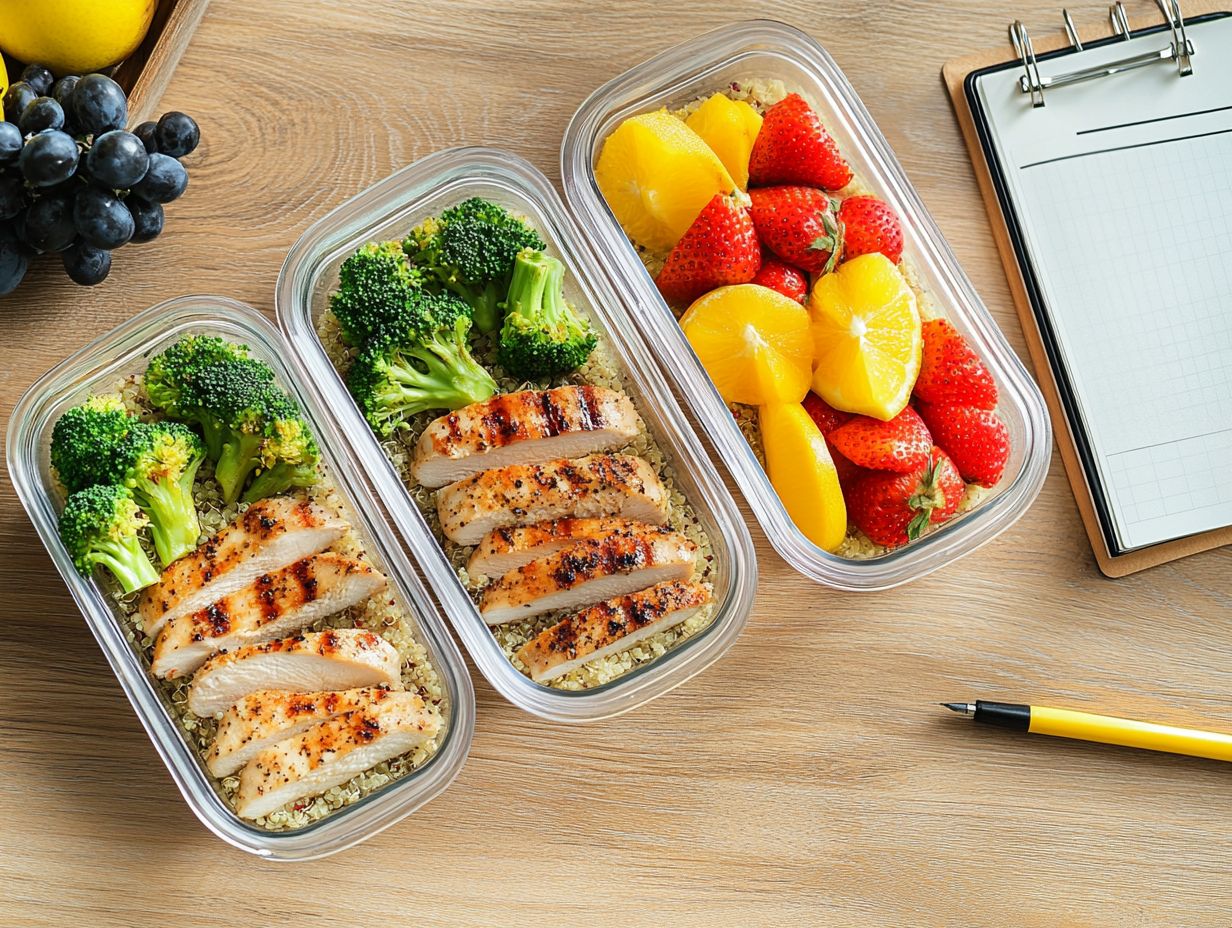
Embracing effective meal planning strategies can profoundly elevate your weight loss journey.
By keeping your meals diverse and nutritious, you will not only align with your health goals but also foster a positive body image throughout the process.
Incorporating Variety and Nutrient-Dense Foods
Incorporating a variety of nutrient-dense foods into your meal plan is essential for achieving optimal energy and satisfying your dietary needs.
Introducing a broad spectrum of colors, textures, and flavors can stimulate your appetite and ensure that your body receives a well-rounded array of vitamins and minerals.
Nutrition plays a pivotal role in maintaining overall health. Embracing healthy recipes allows you to unleash your creativity in the kitchen while promoting balanced meals.
To streamline the process, consider dedicating a few hours each week to meal prepping: chop vegetables, cook grains, and portion out proteins.
When it’s time to cook, you’ll have everything ready, making it easy to prepare delicious meals that inspire delight at every table.
Portion Control and Mindful Eating
Mastering portion control and practicing mindful eating are essential elements of a successful meal plan. They empower you to regulate calorie intake and foster a healthier body image.
By focusing on the size and quality of each serving, you can cultivate a more intentional approach to your meals.
This allows you to truly savor the flavors and textures, rather than rushing through your dining experience.
Mindful eating invites you to tune into your hunger and satiety cues, leading to more thoughtful decisions about what you consume. These techniques bolster your physical health and alleviate anxiety surrounding dieting.
With a more relaxed attitude towards food, you can nurture a positive relationship that enhances your overall well-being, transforming every meal into a fulfilling experience.
Meal Prepping for Success
Meal prepping is a highly effective strategy that saves you valuable time during hectic weekdays and ensures you have nutritious recipes on hand.
These meals perfectly align with your weight loss goals and exercise regimen.
Time-Saving Tips and Tricks
Try these time-saving tips in your meal prepping! They will transform your experience and keep you focused on healthy eating.
Embrace batch cooking techniques to prepare generous quantities of staples like quinoa, brown rice, or roasted vegetables all at once.
Getting creative with leftovers reduces food waste and adds exciting variety to your meals. For example, yesterday’s grilled chicken can easily be transformed into wraps or salads for a delightful next-day treat.
These strategies save you precious time during busy weeks and foster a nutritious diet. Home-cooked meals give you better control over ingredients, ensuring balanced nutrition is always within your grasp.
Staying on Track with Your Meal Plan
Remaining committed to your meal plan demands a blend of dedication and thoughtful strategies to tackle potential challenges.
This includes effectively managing your calorie intake and seamlessly incorporating your exercise routine, all while considering any underlying health conditions that may need attention.
Dealing with Challenges and Maintaining Motivation
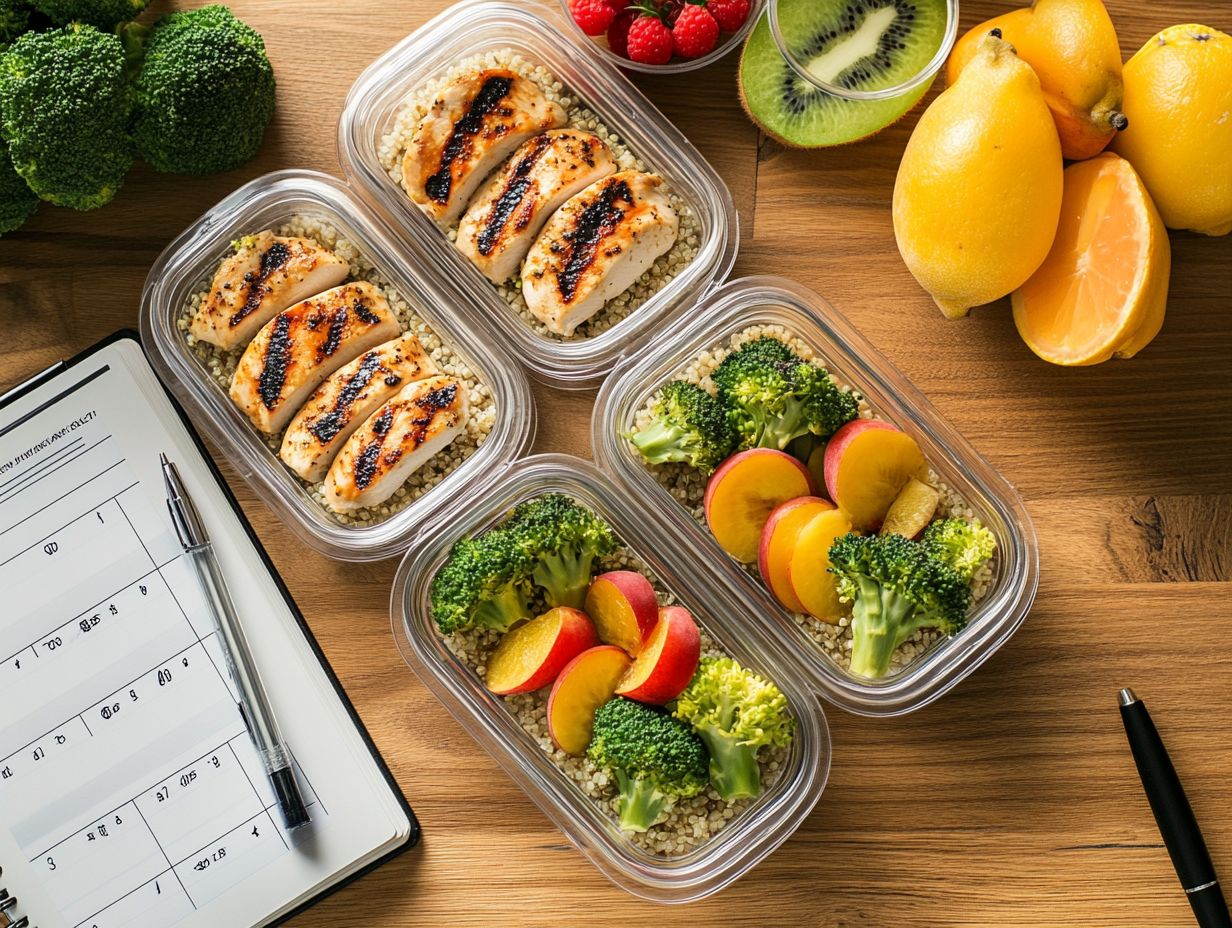
Dealing with the challenges that pop up during your weight loss journey is vital for keeping your motivation high and maintaining a positive body image. After all, you want to avoid those frustrating moments that can lead to discouragement.
These hurdles often show up as sudden cravings for comfort foods or the pressure to indulge at social gatherings overflowing with unhealthy options. Remember, you can tackle these situations head-on! It’s normal to face these situations, and there are effective strategies you can use to handle them.
For instance, bringing your own healthy snacks to events can not only quell your hunger but also let you enjoy the social scene without losing sight of your goals. Practice mindfulness techniques like deep breathing or journaling. They can help manage stress and prevent straying from your meal plan.
By embracing a flexible yet focused approach, you empower yourself to overcome obstacles and stay committed to healthy eating. Act now to embrace these strategies and stick to your goals!
Preguntas Frecuentes
Qu es la planificaci n de comidas para la p rdida de peso?
La planificaci n de comidas para la p rdida de peso es el proceso de seleccionar y preparar intencionadamente comidas y refrigerios para apoyar y alcanzar los objetivos de p rdida de peso. Implica planificar tus comidas y refrigerios para la semana o un cierto per odo de tiempo, teniendo en cuenta tus necesidades nutricionales y objetivos cal ricos.
Por qu es importante la planificaci n de comidas para la p rdida de peso?
La planificaci n de comidas es importante para la p rdida de peso porque te ayuda a mantenerte en el camino con tus objetivos nutricionales. Te permite hacer elecciones alimenticias m s saludables y evitar decisiones alimentarias impulsivas o poco saludables. Tambi n ahorra tiempo y dinero al reducir la cantidad de viajes al supermercado y minimizar el desperdicio de alimentos.
C mo empiezo a planificar comidas para la p rdida de peso?
Para comenzar a planificar comidas para la p rdida de peso, primero determina tus necesidades cal ricas diarias y requisitos de nutrientes. Luego, selecciona comidas y refrigerios que cumplan con estas necesidades y sean bajos en calor as. Haz una lista de compras y planifica tus comidas para la semana, incluyendo porciones y ingredientes necesarios. Finalmente, sigue tu plan y haz ajustes seg n sea necesario.
Cu les son algunos consejos para una planificaci n de comidas exitosa para la p rdida de peso?
Algunos consejos para una planificaci n de comidas exitosa para la p rdida de peso incluyen incorporar una variedad de alimentos saludables, planificar comidas y refrigerios que disfrutes y que se ajusten a tus objetivos cal ricos, y preparar comidas y refrigerios con anticipaci n. Tambi n es importante ser flexible y hacer ajustes a tu plan seg n sea necesario.
Puede la planificaci n de comidas ayudarme a perder peso m s r pido?
La planificaci n de comidas puede ayudarte a perder peso m s r pido al asegurar que est s consumiendo consistentemente un d ficit cal rico y haciendo elecciones alimenticias saludables. Sin embargo, la p rdida de peso tambi n depende de otros factores como el ejercicio y el estilo de vida en general, por lo que la planificaci n de comidas debe ser utilizada como una herramienta para apoyar tu viaje de p rdida de peso.
Hay desventajas en la planificaci n de comidas para la p rdida de peso?
Las desventajas pueden incluir la posibilidad de volverse r gido con la dieta, lo que puede llevar a un sentimiento de privaci n. Adem s, si no se planifica adecuadamente, puede resultar en comidas mon tonas que no sean satisfactorias. Es importante encontrar un balance que funcione para ti.
Desventajas de la planificaci n de comidas
Una posible desventaja de la planificaci n de comidas para la p rdida de peso es que puede sentirse restrictiva o aburrida si no incluyes alimentos que disfrutes. Mant n un buen balance y s flexible para disfrutar de tu viaje.
C mo empiezo a planificar comidas?
Para comenzar a planificar comidas para la p rdida de peso, determina tus necesidades cal ricas diarias y requisitos de nutrientes. Selecciona comidas y refrigerios que cumplan con estas necesidades y que sean bajos en calor as.
Haz una lista de compras y planifica tus comidas para la semana, incluyendo porciones e ingredientes necesarios. Sigue tu plan y haz ajustes seg n sea necesario.
Consejos para una planificaci n de comidas exitosa
Incorpora variedad de alimentos saludables y planifica comidas que disfrutes. Prep ralas con anticipaci n para que sea m s f cil seguir tu plan.
S flexible y ajusta tu plan cuando sea necesario.
Puede ayudarme a perder peso m s r pido?
La planificaci n de comidas puede ayudarte a perder peso m s r pido al asegurar que est s consumiendo un d ficit cal rico. Esto significa que comes menos calor as de las que quemas.
Sin embargo, la p rdida de peso tambi n depende de otros factores como el ejercicio y el estilo de vida, as que usa la planificaci n de comidas como una herramienta para tu viaje de p rdida de peso.
